- April 4, 2025
-
-
Loading
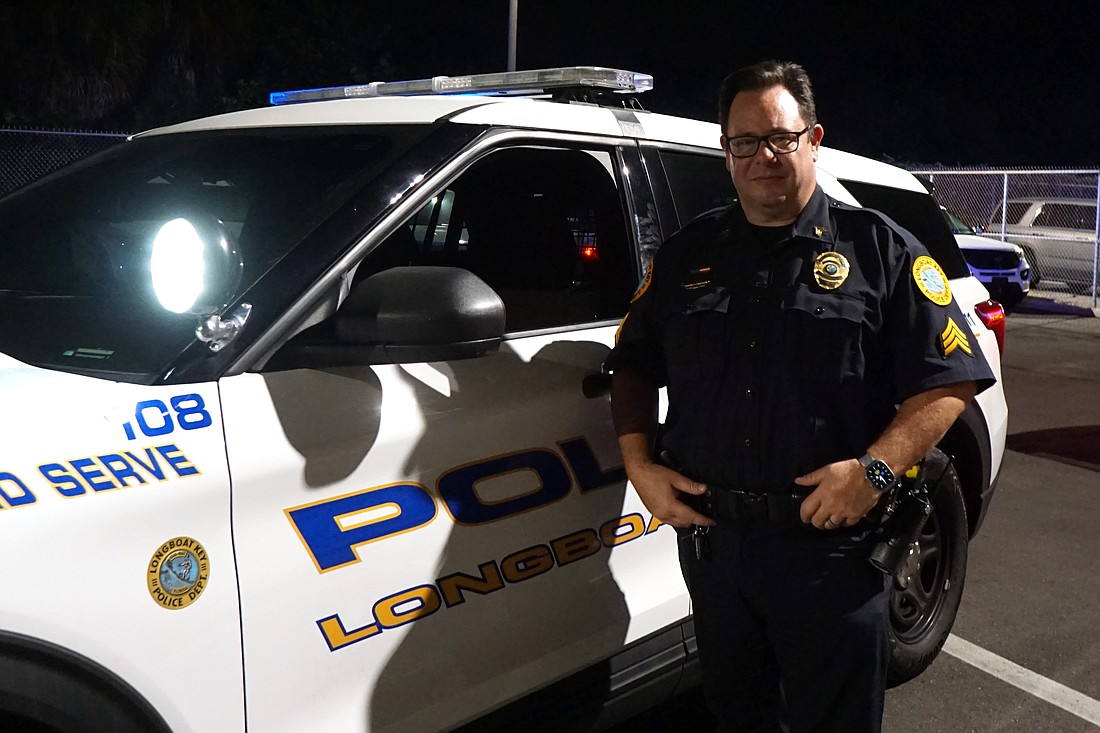
Night patrol for a police officer is completely different territory.
As the sun sets, a new batch of officers comes in to patrol Longboat Key for the night. Sergeant Sean Butler begins the night by taking roll in the department’s headquarters.
The roll for the 12-hour shift includes himself, Officer Justin Ramsaier and a new face at the department, Officer Simon Maple.
That’s it.
Usually there’s at least one more patrol officer on duty, but the department is short-staffed right now. Two officers are out due to injuries while in the field.
Maple is still in field training, so he cannot yet be on patrol by himself. Tonight he’ll go with Ramsaier, meaning there will only be two patrol cars to respond to calls from 7 p.m. to 7 a.m. the following morning.
Just as the group is finishing up roll, calls come swarming in over the radio — there’s a shooting near Booker High School.
“Never good when you hear shots fired at a school,” Butler said.
Before leaving for the night, he texts his friend, who is a school resource officer at the high school, to check in. No injuries or property damage were reported.
The main thing on the officers’ agenda tonight is to check on the Temple Beth Israel. The temple is having an event, and it requested additional patrolling given current events in the Middle East. Butler sends Ramsaier and Maple to start there.
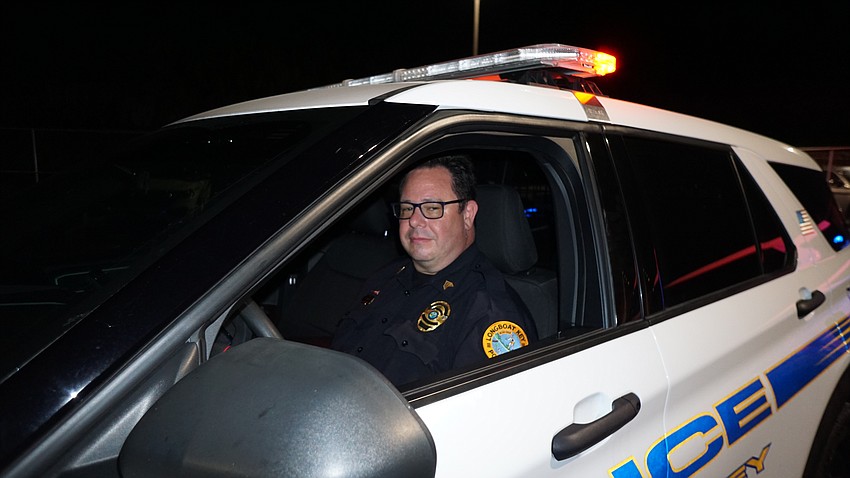
A couple minutes into Butler’s patrol, an alarm blares from the in-car computer. It’s an alert from a license plate reader.
There’s three positioned on the island: one at the north end, one at the south end and one at mid-island. The cameras scan the license plate of every car that passes by. When a license plate comes back as a potential offender, an alarm sounds through the patrol car's computer.
The officers don’t automatically flip on their lights and pursue the car.
Butler copies the license plate number and double checks with a second database. Sometimes, he said, rental cars come back with violations like “expired registration.”
The first one was a rental — a newer car with the owner listed as a rental car company.
License plate readers are constantly running on the island. One day, Butler said it went off 44 times in one hour.
It’s quiet for a Friday, Butler said.
He starts with checking the beach access points. None are closed yet at 8:30 p.m., but he’ll circle back in a little while after they close at 11 p.m.
As he leaves Broadway Street, an alert pops up from the license plate reader. It’s for a suspended license on a blue BMW.
“Possible hot file hit. Violent tendencies alert,” the computer reads aloud.
The screen also displays which camera and in what direction the car was seen traveling: LBK North, Northbound.
Not too far away — this kicks Butler into a different gear.
He whips the car around and heads back to the Broadway Street and Gulf of Mexico Drive intersection. He heads toward the beach access point, but as he does the blue BMW pulls out of a driveway behind him.
Butler turns the car 180 degrees and speeds off toward the blue BMW. After confirming the plate, he flips the lights on and sounds the siren.
After calling the stop into dispatch, he wastes little time getting out of the patrol car. On his way to the driver side window, he touches the trunk of the car.
Minutes later he heads back to the car. It wasn’t the owner of the car with the “violent tendencies,” but rather his wife. Still, she has no proof of insurance.
Butler runs her name to see if she does have insurance, which she does. So he decides to just give her a warning.
He writes up the warning on the computer and presses print. Then, he leans towards the driver door as the center console becomes an in-car printer.
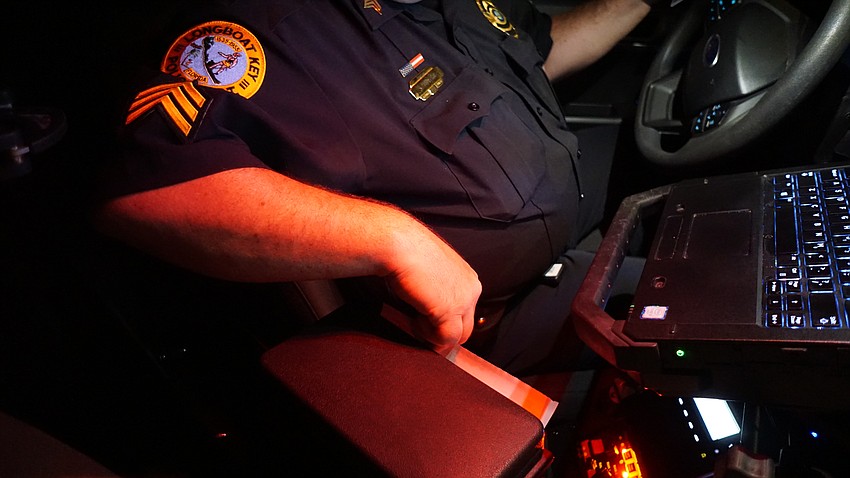
From 9 to 10 p.m. are the “witching hours,” Butler said.
That’s when a lot of businesses are getting ready to close, and when they’re more vulnerable to robberies.
The night patrol officers routinely conduct business checks during these hours, and throughout the entire night.
While patrolling behind Whitney Beach Plaza, Butler notices a white truck with no license plate. He approaches the truck and notices the VIN number is scratched off the truck.
After checking to make sure no one is in the truck, he opens the unlocked driver door and gets the VIN number. A simple check shows the vehicle is registered to one of the businesses in the plaza. Since it’s on private property and not on the road, there's nothing further for Butler to do.
In his car, Butler looks at his computer screen which shows which officers are dispatched where. The screen still shows he’s at the previous traffic stop, but also indicates he’s available. Service issues on the island are a big issue for the department, he said.
Around 9:20 p.m., Butler receives a call from dispatch about a woman who was sending alarming texts to her husband, possibly suicidal.
He arrives at the condo building minutes later, but waits another minute for Ramsaier and Maple to get to the scene.
About a half an hour later, the three return to their cars with the woman. Ramsaier and Maple will transport her to Sarasota Memorial Hospital.
Butler is now the only officer on patrol on Longboat Key.
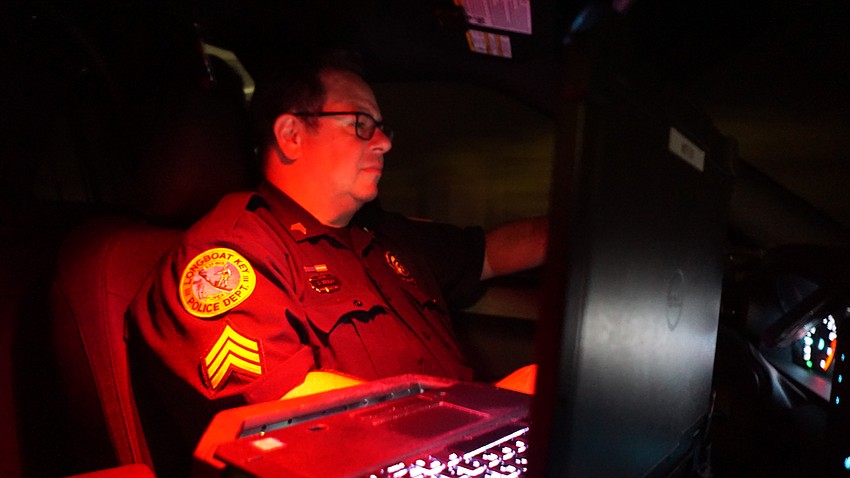
He decides to return to the temple to make sure everyone safely left after the event. All good there.
Nights aren’t as busy as days, Butler says. But the calls during the night are more dangerous — the dark adds a different element, and officers are on a much higher alert.
The night shifts run from 7 p.m. to 7 a.m., and the officers rotate shifts every three months. This current rotation just started.
“I’m lucky I’m one of those people that doesn’t need a lot of sleep,” Butler said. He’s fine with just four hours sometimes.
That’s good for him, too, as the department works toward accreditation. It’s a lot of work, especially for higher-ranking officers like Butler. A lot of the accreditation process requires him to work past the required 12-hour shift.
Despite nights not being as busy, Butler said the officers stay busy.
“For a sleepy little town, it has its moments,” he said.
Butler continues his patrol and heads toward the south end of the island. Around 10:30 p.m., he turns around at Overlook Park but doesn’t get past the gas station before seeing a car with a broken headlight.
Quickly, he turns his patrol car around and flashes his lights.
The car pulls over, and Butler goes through the same routine: call it in to dispatch, run the plate, then calmly approach.
As he does, he touches the trunk again.
Traffic stops, along with domestic violence calls, are the two most dangerous situations, according to Butler.
He touches the trunk to make sure it’s closed. If it isn't, there’s a threat that someone could pop out of the trunk and attack the officer.
Some people say officers touch the trunk to leave their fingerprints, but Butler said he’s never actually seen that.
Butler also explains his process when pulling someone over.
It always starts with a greeting, and then explaining to the person why they were pulled over. Then, he said he always gives people a chance to explain or own up to the wrongdoing.
This driver was allegedly unaware of the headlight, but did know he lacked insurance. Butler gave him a warning for the headlight, but couldn’t let the insurance issue slide.
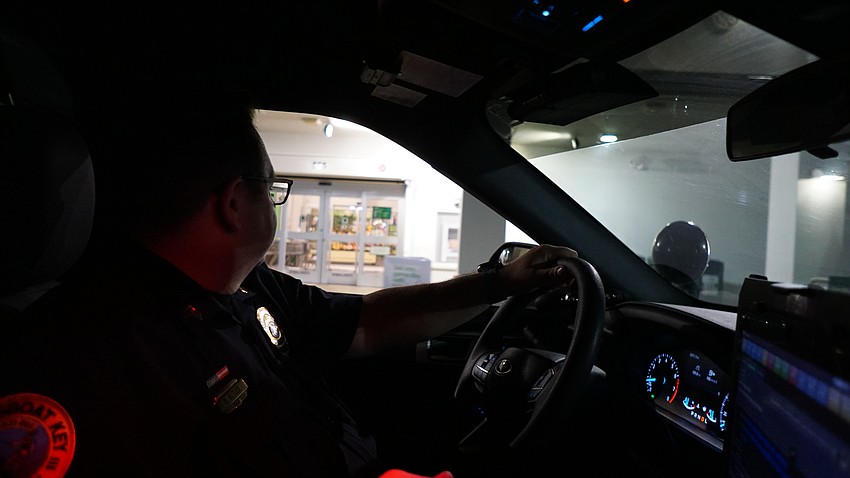
Now it’s past 11 p.m. Time to go back and check the beach access points.
As Butler drives up and down the island, the radio is teeming with calls. Dispatch is shared with Sarasota, so Butler said officers have to develop a sort of “radio ear” trying to hear for the department’s call sign.
Just three days prior, on Oct. 10, the county dispatch changed Longboat’s call sign. It’s something Butler and the other officers are trying to re-learn.
For the next two hours, “sleepy” Longboat lives up to its name. No one is hanging around the beach access points too late. Business checks are all clear.
Past midnight, the streets are almost empty.
But for Butler, it’s not difficult to stay awake. There’s always something to do, even if it is just checking in on businesses.
That’s another reason he likes Longboat: serving the community in ways other departments may not.